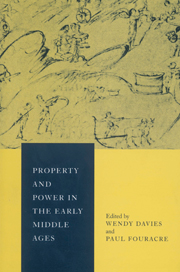Book contents
- Frontmatter
- Contents
- List of maps
- Preface
- List of abbreviations
- Introduction
- 1 The ideology of sharing: apostolic community and ecclesiastical property in the early middle ages
- 2 Teutsind, Witlaic and the history of Merovingian precaria
- 3 Eternal light and earthly needs: practical aspects of the development of Frankish immunities
- 4 The wary widow
- 5 Lordship and justice in the early English kingdom: Oswaldslow revisited
- 6 Adding insult to injury: power, property and immunities in early medieval Wales
- 7 Property transactions and social relations between rulers, bishops and nobles in early eleventh-century Saxony: the evidence of the Vita Meinwerci
- 8 Monastic exemptions in tenth- and eleventh-century Byzantium
- 9 Property ownership and signorial power in twelfth-century Tuscany
- 10 Conclusion: property and power in early medieval Europe
- Glossary
- List of works cited
- Index
6 - Adding insult to injury: power, property and immunities in early medieval Wales
Published online by Cambridge University Press: 25 January 2010
- Frontmatter
- Contents
- List of maps
- Preface
- List of abbreviations
- Introduction
- 1 The ideology of sharing: apostolic community and ecclesiastical property in the early middle ages
- 2 Teutsind, Witlaic and the history of Merovingian precaria
- 3 Eternal light and earthly needs: practical aspects of the development of Frankish immunities
- 4 The wary widow
- 5 Lordship and justice in the early English kingdom: Oswaldslow revisited
- 6 Adding insult to injury: power, property and immunities in early medieval Wales
- 7 Property transactions and social relations between rulers, bishops and nobles in early eleventh-century Saxony: the evidence of the Vita Meinwerci
- 8 Monastic exemptions in tenth- and eleventh-century Byzantium
- 9 Property ownership and signorial power in twelfth-century Tuscany
- 10 Conclusion: property and power in early medieval Europe
- Glossary
- List of works cited
- Index
Summary
There is little to indicate, for much of the early medieval period in Wales, that ownership of land involved anything more than the power to collect rent, produce and profits from that land – whether production was organized through a direct labour force or through tenancies. Most charter texts are surprisingly vague about the powers conveyed when property changed hands, and the proprietary terms that are so characteristic of English and continental charters are strikingly absent. It looks as if landowners' interests were primarily economic, although to the extent that they controlled a dependent workforce they inevitably acquired power over people too. This vagueness is especially marked in the earliest texts, of all types, that is of sixth- to eighth-century material, and is often so for the ninth- and tenth-century period.
By the eleventh century, however, power over property could clearly bring the landowner more than rents and produce and it looks as if the tenth century was a turning point in attitudes and practice. In what follows, I shall investigate the incidence of compensation to landowners for offences committed on their lands; explain the Welsh concepts of nawdd (protection), sarhaed (insult) and braint (privilege), and show how they provide the mental framework for such compensations; detail the establishment of the earliest territorial immunities which excuse the holder from royal demands, and the development (and historical context) of more elaborate immunities held by institutions; and, finally, isolate the essential processes that led to this development. In the end, the individual's right to protect turned into the institution's right to exemption from political dues and demands.
- Type
- Chapter
- Information
- Property and Power in the Early Middle Ages , pp. 137 - 164Publisher: Cambridge University PressPrint publication year: 1995
- 1
- Cited by



